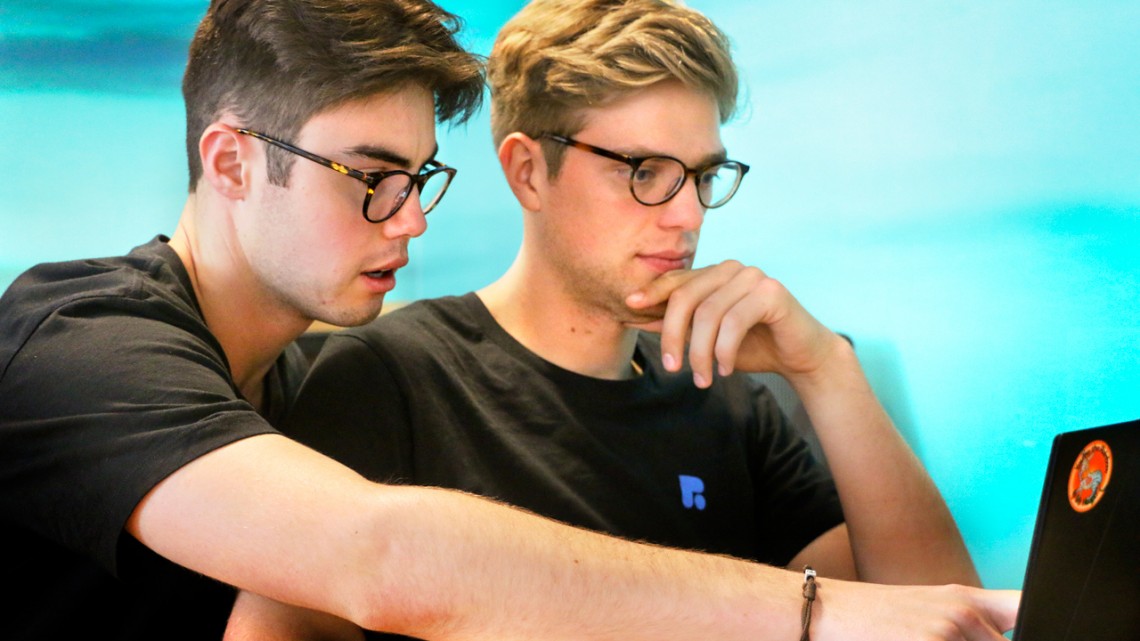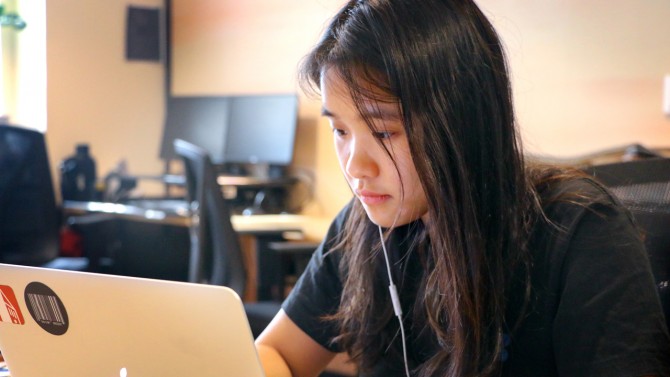
Conner Swenberg, left, and Nolan Gray work together on their project, Response, which helps humanitarian organizations to quickly and efficiently buy supplies during emergency response.
Beck fellowships help support student entrepreneurs
By Kathy Hovis
Eleven Cornell students worked all summer to move their businesses forward, thanks to the Marla and Barry ’90 Beck Entrepreneurship Fellows Program.
The program, in its first year, offers grants of $5,000 to allow students to work on their startup without needing another summer job.
Beck fellow Shiang-Wan Chin’s business, farmVal, uses a machine learning model to determine soil health and predict how it will change over time, based on a multitude of factors. The information is especially helpful as banks review farm loans, because monitoring soil health is a good predictor of farm success, said Chin, M.Eng. ’19, a doctoral student studying systems engineering.
“It’s truly been about the mission and the social impact our business can have,” said Chin, adding that his team of six is currently focused on developing countries in Africa, Asia and Latin America. “We could help about 500 million small farms gain access to loans and credit. This is also about gender equity; women have a harder time getting loans.”
Chin said environmental impact plays a part in their evaluation; sustainability is tied into their metrics.
The Beck fellowship allowed the team to take part in an accelerator program, expand their marketing knowledge and pay for the legal costs of a startup. “I’m inspired by the entrepreneurship community and the support we have at Cornell,” Chin said.
Beck fellow Keivan Shahida ’20 spent the summer in Washington, D.C., working with nonprofits that could be helped by his business, Response, a sourcing platform that allows humanitarian organizations to quickly and efficiently buy supplies during emergency response.
Started during Shahida’s sophomore year, the business took top honors at a Life-Changing Labs (LCL) pitch competition and the College of Engineering’s Innovation Challenge Competition. The team also spent a summer in the LCL incubator program and was a member of the eLab business accelerator program, both in Ithaca.
“Right now, the procurement process is an incredibly antiquated paper- and email-based system,” said Shahida, a computer science major in the College of Engineering. “There are these long email chains and PDFs sent back and forth.”
The Response system allows nonprofits to create projects digitally and specify their criteria for grading a bid. The platform will automatically grade the bids and send bidder contact information back to the organization. The team is already testing a pilot platform with nongovernmental organizations in Syria and India.
“We did more than 100 interviews with procurement officers and we had executives reaching out to us for advice,” Shahida said. “We realized this is something we should be building because they were basically pulling the solution out of us.”
Shahida’s team used the Beck funding to hire more students to help develop the app and test the process from end to end.
Marla and Barry Beck founded the fellowship program to boost entrepreneurial resources for Cornell students, and lay the foundation for its fellows to excel as entrepreneurs beyond their college years.
“There is no exact formula for the dynamic uncertainty of the business creation process, so it has been incredibly meaningful for us to know that our program can help alleviate the pressures of entrepreneurship in some small way,” said Barry Beck, who sits on the Cornell University Council and the advisory council of the ILR School. “Young entrepreneurs like Shiang-Wan Chin and Keivan Shahida continue to inspire us as they pursue excellence in their new ventures.”
Kathy Hovis is a writer for Entrepreneurship at Cornell.
Media Contact
Get Cornell news delivered right to your inbox.
Subscribe

